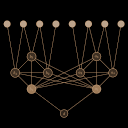when we began our investigation of natural wayfinding we broke it down into three parts: focus, memory, and prioritization. the former two make up the prerequisite skills of wayfinding, but they only take you as far as map reading. the last, the ability to prioritize, is what is needed to find your way.
luckily you are already pretty good at prioritizing! you prioritize all the time without even realizing it. that's because this is the faculty by which you do things: you must always choose what things to do because you cannot do everything at once. do you breathe now? eat? drink? dance? read? the choices you make are the result of a complex process of prioritizing all possible actions.
to appreciate just how hard it is to choose, consider the problem of building an artificial intelligence. early on computer scientists thought it would be easy: just put a bunch of info in the computer, set up some simple, self-improving algorithms to work with it, and you'll get an ai. but it turns out that doesn't work: we today have computers with far more focus and memory than any human could ever have, but we still don't consider them to have intelligence on par with insects let alone humans. why aren't computers already intelligent? because their prioritization mechanisms are too simple.
what humans and most animals can do that computers cannot do yet is rapidly make nuanced decisions among infinitely many possible choices that steer the world towards a particular state. computers instead rely on humans to narrow down their choices enough that they can decide among a finite set of possible actions (this is, in essence, what an algorithm and, by extension, a computer program is). we take prioritization for granted, but trying to understand it well enough to build it has made it very clear that it's amazingly difficult and requires tremendous complexity.
so choosing is hard, but luckily we are like magic prioritization black boxes that somehow know how to do it without really understanding how we do it. we regularly pick from among unlimited possible actions, mostly without any awareness of how it happens. yet there is a small part of the prioritization process we notice because we have access to it, and that part is conscious choice. but conscious choice is expensive and limited. in fact, it's limited by the same 5 thought limit we have on our memory.
because it's hard to think more than 5 thoughts at the same time, it's hard to consciously prioritize among more than 5 potential actions at once. there's not much we can do to optimize prioritization beyond improving focus and memory, but we can augment our ability to choose similar to how we augment memory. so if you need to consciously prioritize among more than 5 things, and you are sure you can't simplify your life so you don't have to choose among more than 5 things, then you need a prioritization system.
all good prioritization systems are built around:
- creation: putting stuff you need to get done in a simple, reliable, highly available system
- curation: keeping the system clean and current so you can trust it completely (if you don't trust it then it won't work because you'll defend your sanity by continuing to try to prioritize solely in your head)
- choice: looking at that system when you need to choose what to do because it is not immediately obvious or because you are confused
the most popular modern manifestation of a system with these three-cs is getting things done. it's a great choice to get started, and gtd learning materials will teach you how to work a prioritization system. but gtd is only one way: once you master the basics you will likely go on to build your own system that fits your life and the tools available to you.
but i have to end on a warning. prioritization systems can be intoxicating to some people who would give themselves up to the system so they don't have to choose. it doesn't work like that! you are the engine the drives the prioritization system: the system has no power to drive you. if you abdicate decisions to the system no decisions will be made and the system will just drain your time. you are the agent, and the prioritization system is a tool to help you, not the other way around.
